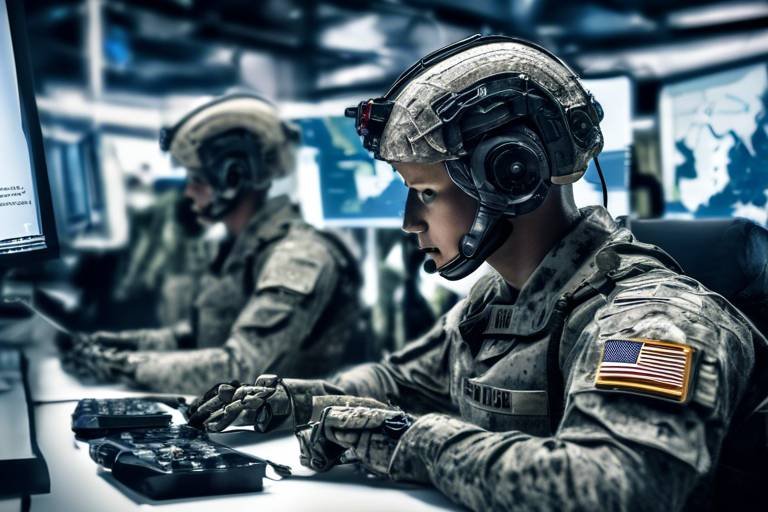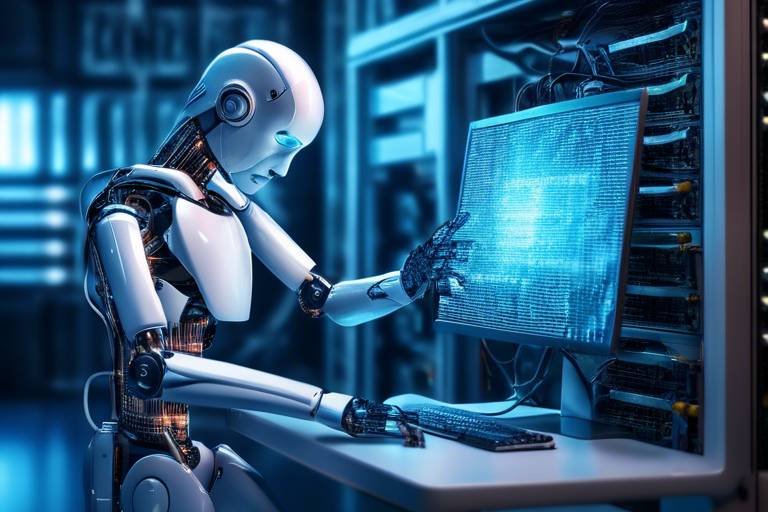The Future of AI in Military and Defense
The landscape of military operations is undergoing a seismic shift, largely driven by the rapid advancements in artificial intelligence (AI). As we stand on the brink of a new era, the integration of AI into military and defense strategies is not just a trend; it's a revolution that promises to redefine how wars are fought and won. Imagine a battlefield where decisions are made in real-time, where machines can analyze vast amounts of data faster than any human could ever dream. This is the future that AI is paving the way for, and it's filled with both exciting possibilities and profound challenges.
At its core, AI's role in military operations extends beyond mere automation. It's about enhancing human capabilities and providing commanders with tools that can lead to more informed and strategic decisions. Picture this: a military commander in the field, surrounded by chaos, can now access a dashboard powered by AI that synthesizes data from various sources—satellite imagery, drone feeds, and even social media. This capability enables commanders to grasp the situation swiftly, allowing for tactical maneuvers that could be the difference between victory and defeat.
However, with great power comes great responsibility. The ethical implications of deploying AI in military contexts are vast and complex. As we develop autonomous weapons systems, we must grapple with questions about accountability. If an AI-controlled drone makes a mistake, who is held responsible? The programmer? The military leader? Or is it the machine itself? These are the tough questions we need to address as we move forward.
Moreover, the integration of AI into military operations raises significant concerns about human oversight. While machines can process data at lightning speed, the nuances of human judgment are irreplaceable. Maintaining a balance between AI efficiency and human intuition is crucial to ensure that ethical decision-making remains at the forefront of military strategies.
As we explore the future of AI in military and defense, we must also consider its role in intelligence gathering. AI's ability to analyze and interpret vast datasets can enhance situational awareness, providing military leaders with insights that were previously unattainable. This capability not only improves operational efficiency but also helps in anticipating enemy movements and strategies, giving a significant edge in combat scenarios.
In addition, the intersection of AI and cybersecurity is becoming increasingly vital. With military networks being prime targets for cyber threats, leveraging AI for threat detection and response is essential. AI-enhanced defense mechanisms are being developed to bolster the resilience of military systems against cyberattacks. These advancements not only protect sensitive information but also ensure that military operations can continue uninterrupted in the face of emerging threats.
Looking ahead, the trends in military AI suggest a future where systems are more integrated, fostering collaboration between human operators and AI technologies. This synergy will enhance overall mission effectiveness and adaptability in dynamic combat environments. As we embrace these changes, we must remain vigilant about the implications of AI in warfare, ensuring that we navigate this new terrain with caution and foresight.
- What are the main benefits of AI in military operations?
AI enhances decision-making, improves situational awareness, and increases operational efficiency by providing real-time data analysis and predictive insights.
- What ethical concerns are associated with the use of AI in military applications?
Ethical concerns include accountability for AI actions, the use of lethal force, and the moral responsibilities of human operators overseeing AI systems.
- How does AI improve cybersecurity in military contexts?
AI is used for threat detection and response, helping to safeguard military networks from cyber threats and ensuring the integrity of sensitive information.
- What trends are shaping the future of AI in military and defense?
Future trends indicate a shift towards integrated systems that promote collaboration between human operators and AI to enhance mission effectiveness.

AI-Powered Decision Making
In the rapidly evolving landscape of military operations, artificial intelligence is not just a futuristic concept; it's a present-day reality that is reshaping how decisions are made on the battlefield. Imagine a scenario where commanders can access real-time data analysis at their fingertips, enabling them to make informed decisions faster than ever before. This is the power of AI-powered decision-making. By harnessing vast amounts of data from various sources, AI systems can sift through information, identifying patterns and offering predictive insights that human analysts might overlook. This capability is akin to having a super-intelligent assistant who can process and analyze data at lightning speed, ensuring that military leaders are equipped with the most relevant information.
Furthermore, AI enhances operational efficiency by streamlining communication and coordination among different units. Picture a battlefield where every soldier is connected through an AI-driven network, sharing vital information seamlessly. This not only reduces the risk of miscommunication but also allows for a more synchronized approach to military strategy. The integration of AI into decision-making processes means that commanders can anticipate enemy movements, assess risks, and allocate resources more effectively. In essence, AI acts as a force multiplier, amplifying the capabilities of human decision-makers.
However, the adoption of AI in military decision-making is not without its challenges. As we embrace this technology, we must also consider the implications of relying on algorithms to make critical decisions. For instance, how do we ensure that these systems are free from bias? What happens when an AI system makes a recommendation that leads to unintended consequences? These questions highlight the need for rigorous testing and validation of AI systems before they are deployed in real-world scenarios. Moreover, the importance of human intuition and experience cannot be understated. While AI can provide valuable insights, it should complement, not replace, the judgment of seasoned military leaders.
To illustrate the impact of AI on decision-making, consider the following table that outlines key benefits and challenges:
| Benefits | Challenges |
|---|---|
| Real-time data analysis | Potential for algorithmic bias |
| Improved operational efficiency | Reliance on technology over human judgment |
| Enhanced situational awareness | Need for rigorous testing and validation |
| Predictive insights for strategic planning | Ethical implications of automated decisions |
As military organizations continue to explore the potential of AI, it is crucial to strike a balance between leveraging technology and maintaining human oversight. The future of military operations will undoubtedly be shaped by AI, but it is imperative that we proceed with caution, ensuring that our reliance on these systems enhances our capabilities without compromising our ethical standards. In a world where split-second decisions can mean the difference between victory and defeat, the role of AI in decision-making will be pivotal, but it must always be guided by human wisdom and accountability.

Autonomous Weapons Systems
The advent of marks a significant turning point in the landscape of modern warfare. These systems, often referred to as "killer robots," are designed to operate with minimal human intervention, making decisions in real-time based on data inputs. While this technology promises to enhance operational efficiency and reduce the risks to human soldiers, it also raises profound questions about the future of warfare and the ethical implications of delegating life-and-death decisions to machines.
One of the primary concerns surrounding autonomous weapons is the potential for unintended consequences. Imagine a scenario where an autonomous drone, programmed to identify and eliminate enemy combatants, misinterprets a civilian gathering as a hostile threat. The ramifications of such mistakes could be catastrophic, leading to significant civilian casualties and undermining the moral high ground often claimed by military forces. This brings us to the ethical dilemmas that arise when machines are given the power to take lethal actions without human oversight.
Furthermore, the lack of accountability in the use of these systems poses another challenge. If an autonomous weapon commits a war crime, who is held responsible? Is it the programmer, the military leader who deployed it, or the machine itself? These questions highlight the necessity for clear guidelines and frameworks to govern the use of autonomous weapons. The international community is already grappling with these issues, as evidenced by ongoing discussions in forums such as the United Nations, where calls for a ban on fully autonomous weapons systems are gaining traction.
As we delve deeper into the implications of autonomous weapons, it's crucial to consider the role of human oversight. While AI can process vast amounts of data and execute actions faster than a human could, the ultimate decision-making authority should remain with human operators. This ensures that ethical considerations and the complexities of warfare are taken into account. A collaborative approach, where humans and machines work together, can enhance operational effectiveness while maintaining moral responsibility.
In summary, while autonomous weapons systems present exciting opportunities for military innovation, they also come with significant risks and ethical challenges. As we move forward, it’s imperative to strike a balance between leveraging technology for strategic advantages and upholding the principles of accountability and human oversight in warfare.
- What are autonomous weapons systems? Autonomous weapons systems are military technologies that can operate independently to identify and engage targets without human intervention.
- What ethical concerns are associated with autonomous weapons? Key concerns include accountability for actions taken by these systems, the potential for civilian casualties, and the moral implications of delegating lethal decisions to machines.
- Is there a global movement to regulate autonomous weapons? Yes, there are ongoing discussions in international forums, including the United Nations, advocating for regulations or bans on fully autonomous weapons systems.
- How can human oversight be maintained in autonomous military operations? By ensuring that human operators remain in the decision-making loop and are responsible for the actions of autonomous systems.

Ethical Implications of AI
The integration of artificial intelligence (AI) into military applications is not just a technological revolution; it's a profound ethical challenge that we must confront head-on. As we stand on the brink of a new era in warfare, the question looms large: what does it mean to wield such power responsibly? AI systems, capable of making decisions at lightning speed, can potentially alter the course of military engagements, but at what cost? The ethical implications of deploying AI in combat scenarios raise significant concerns that demand our attention.
One of the most pressing issues is the use of lethal force. Imagine a battlefield where machines, not humans, decide who lives and dies. This scenario is no longer a distant sci-fi fantasy; it's becoming a reality. The prospect of autonomous weapons systems capable of executing strikes without human intervention raises serious moral questions. Are we prepared to accept the consequences of machines making life-and-death decisions? The potential for errors or misjudgments in AI algorithms could lead to catastrophic outcomes, including civilian casualties and unintended escalations of conflict.
Furthermore, the ethical responsibility of human operators cannot be overlooked. Who is accountable when an AI system makes a mistake? The ambiguity surrounding accountability in warfare is a slippery slope. As we navigate this terrain, we must establish clear guidelines that delineate the responsibilities of both AI systems and their human counterparts. This is crucial to ensure that we do not absolve ourselves of moral responsibility simply because a machine executed an order.
To illustrate the complexities of these ethical dilemmas, consider the following table that outlines key ethical concerns associated with AI in military applications:
| Ethical Concern | Description |
|---|---|
| Lethal Force | The risk of machines making autonomous decisions regarding life and death. |
| Accountability | Challenges in determining who is responsible for actions taken by AI systems. |
| Civilian Safety | The potential for increased civilian casualties due to errors in AI decision-making. |
| Moral Responsibility | The ethical obligations of human operators in overseeing AI actions. |
In addition to these concerns, we must also consider the implications for civilian safety. The deployment of AI in military operations could blur the lines between combatants and non-combatants, leading to increased risks for innocent lives. The challenge lies in designing AI systems that can differentiate between legitimate targets and civilians, ensuring that ethical considerations are front and center in their programming.
As we delve deeper into these ethical implications, it becomes clear that we need a robust framework to guide the development and deployment of AI in military contexts. This framework should prioritize transparency, accountability, and human oversight. It is essential to foster a culture of ethical reflection among military leaders and technologists alike, ensuring that we do not lose sight of our moral compass in the rush to innovate.
In conclusion, the ethical implications of AI in military operations are vast and complex. As we forge ahead into this new frontier, we must engage in open dialogues about the responsibilities we bear in wielding such powerful technologies. The stakes are incredibly high, and it is our duty to ensure that we navigate this landscape with caution, integrity, and a commitment to preserving human dignity.
- What are the main ethical concerns regarding AI in military applications? The primary concerns include the use of lethal force, accountability for AI actions, civilian safety, and the moral responsibilities of human operators.
- How can we ensure accountability for AI systems in warfare? Establishing clear guidelines and frameworks that define the roles and responsibilities of both AI systems and human operators is crucial.
- What role does human oversight play in AI military operations? Human oversight is essential to ensure ethical decision-making and to mitigate risks associated with autonomous systems.

Accountability in Warfare
In the rapidly evolving landscape of military technology, the question of accountability in warfare has become increasingly complex, particularly with the integration of artificial intelligence (AI) in combat scenarios. Traditional warfare has always placed accountability squarely on the shoulders of human commanders and soldiers. However, as machines begin to take on more autonomous roles, determining who is responsible for their actions becomes a significant challenge. This is not just a legal issue; it's a moral one that society must grapple with.
Imagine a scenario where an autonomous drone makes a decision to engage a target based on its programmed parameters. If that decision results in civilian casualties, who is held accountable? Is it the programmer who created the AI, the military officer who deployed it, or the machine itself? These questions highlight the urgent need for clear guidelines and frameworks that define accountability in AI-driven warfare.
To navigate this murky territory, several key considerations must be addressed:
- Legal Frameworks: Existing military laws and regulations may not adequately cover the actions of AI systems. New laws may need to be established to address these unique challenges.
- Moral Responsibility: Even with AI making decisions, there should always be a human element involved. The moral implications of using AI in warfare must be considered, ensuring that human judgment is not entirely removed from the process.
- Transparency: For accountability to be effective, there must be transparency in how AI systems make decisions. Understanding the algorithms and data that inform these decisions is crucial for holding the right parties accountable.
Moreover, the integration of AI into military operations raises the question of whether these systems can be truly trusted to act in accordance with international humanitarian laws. As machines lack the ability to empathize or understand the nuances of human conflict, their actions could lead to unintended consequences that further complicate accountability.
Ultimately, establishing accountability in warfare involving AI requires a multi-faceted approach. It involves not only legal and ethical considerations but also a commitment to maintaining human oversight. As we look to the future, it is essential that we create a robust framework that ensures responsibility and transparency in the use of AI in military operations, thereby safeguarding both human lives and the integrity of military engagements.
- Who is responsible for the actions of an autonomous weapon?
Accountability typically lies with the military personnel who deploy the system, the developers of the AI, and the military leadership that establishes its operational parameters. - Can AI systems be held legally accountable?
Currently, AI systems cannot be held legally accountable as they lack the capacity for moral reasoning. Legal frameworks need to evolve to address these issues. - What role should humans play in AI-driven military operations?
Humans should maintain oversight to ensure ethical decision-making and to intervene when necessary, especially in situations where civilian lives are at stake.

Human Oversight in AI Operations
In the rapidly evolving landscape of military technology, the integration of artificial intelligence (AI) into operational frameworks has sparked a crucial conversation about the necessity of human oversight. While AI systems can process vast amounts of data and execute tasks with remarkable speed and accuracy, the absence of human intervention raises significant concerns about the ethical implications and potential risks associated with autonomous decision-making in combat scenarios. Imagine a self-driving car navigating through traffic; it might be efficient, but what happens when it encounters an unexpected obstacle? Similarly, in military operations, AI systems may face unpredictable situations where human judgment becomes indispensable.
The role of human operators is not merely to supervise AI but to provide the critical thinking and moral reasoning that machines currently lack. As AI takes on more responsibilities, the potential for errors increases, especially in high-stakes environments. A miscalculation by an AI system could lead to unintended casualties or escalate conflicts. Therefore, implementing robust oversight mechanisms is essential to ensure that human operators can intervene when necessary, making decisions that align with ethical standards and operational goals.
Moreover, human oversight fosters accountability. In a world where autonomous systems are making life-and-death decisions, it is vital to establish who is responsible for those actions. Without clear accountability, the military risks entering a gray area where the line between right and wrong becomes blurred. By ensuring that humans remain in the loop, we can uphold the moral and legal frameworks that govern military conduct.
To effectively integrate human oversight into AI operations, military organizations must consider the following key aspects:
- Training and Education: Operators must be well-versed in AI technologies to effectively monitor and intervene in AI-driven processes.
- Clear Protocols: Establishing guidelines for when and how human operators should intervene can help mitigate risks associated with AI decision-making.
- Continuous Evaluation: Regular assessments of AI systems and their outcomes can identify areas where human oversight is particularly critical.
As we look to the future, the collaboration between AI and human operators will likely define the success of military operations. By embracing a model where AI enhances human capabilities rather than replacing them, we can create a more effective and ethical military framework. The essence of warfare may change, but the human element must remain at the forefront, ensuring that technology serves humanity rather than the other way around.
- What is the role of AI in military operations? AI assists in data analysis, decision-making, and operational efficiency, transforming how military strategies are formulated and executed.
- Why is human oversight important in AI operations? Human oversight is crucial for ethical decision-making, accountability, and ensuring that AI systems operate within established moral frameworks.
- How can military organizations ensure effective human oversight of AI? Through training, clear protocols, and continuous evaluation of AI systems, military organizations can maintain effective human oversight.
- What are the risks of autonomous weapons systems? Autonomous weapons systems pose risks such as unintended casualties, ethical dilemmas, and challenges in accountability.

AI in Intelligence Gathering
Artificial Intelligence is revolutionizing the way military forces gather and analyze intelligence. Imagine having a super-intelligent assistant that can sift through mountains of data in seconds, identifying patterns and providing insights that would take humans weeks to uncover. This is precisely what AI brings to the table in intelligence gathering. By leveraging advanced algorithms and machine learning techniques, AI systems can process vast amounts of information from various sources, including satellite imagery, social media, and intercepted communications, to deliver actionable intelligence.
One of the most significant advantages of AI in this domain is its ability to enhance situational awareness. With AI-powered tools, military analysts can receive real-time updates on potential threats, troop movements, and environmental changes. For instance, AI can analyze satellite images to detect unusual activities in a specific area, alerting commanders to potential enemy movements or logistical operations. This capability not only accelerates decision-making but also minimizes the risk of human error, which is critical in high-stakes scenarios.
Moreover, AI's role in intelligence gathering isn't just about speed; it's also about accuracy. Traditional methods of data analysis often rely on human interpretation, which can be subjective and prone to biases. In contrast, AI systems can analyze data objectively, providing a more balanced view of the situation. This is particularly important when it comes to distinguishing between genuine threats and false alarms. For example, AI can help filter out noise from social media or other communication channels, pinpointing credible sources of information that require further investigation.
To illustrate the impact of AI on intelligence gathering, consider the following table that outlines the key capabilities of AI systems:
| AI Capability | Description |
|---|---|
| Data Processing | Analyzes large datasets quickly to identify trends and anomalies. |
| Predictive Analytics | Uses historical data to forecast potential future events and threats. |
| Image Recognition | Identifies objects and activities in imagery, enhancing surveillance capabilities. |
| Natural Language Processing | Interprets and analyzes human language from various communication sources. |
As we look to the future, the integration of AI in intelligence gathering will likely continue to evolve. We can expect to see more sophisticated systems that not only gather intelligence but also provide predictive insights that can shape military strategies. However, this advancement comes with its own set of challenges, particularly in terms of data privacy and the ethical implications of surveillance. As military organizations adopt these technologies, they must also navigate the delicate balance between enhancing operational effectiveness and respecting the rights of individuals.
In conclusion, AI's role in intelligence gathering is a game-changer for military operations. By enabling faster, more accurate analysis of vast amounts of data, AI not only enhances situational awareness but also supports strategic decision-making. As we embrace these technologies, it is crucial to remain vigilant about the ethical considerations that accompany their use, ensuring that we harness their potential responsibly.
- What are the main benefits of using AI in military intelligence gathering?
AI enhances speed, accuracy, and situational awareness, allowing military forces to make informed decisions quickly. - How does AI improve data analysis in military operations?
AI systems can process large datasets objectively, identifying patterns and anomalies that might be missed by human analysts. - What ethical concerns arise from the use of AI in military intelligence?
Concerns include data privacy, the potential for surveillance overreach, and the moral implications of automated decision-making.

Cybersecurity and AI
The intersection of artificial intelligence (AI) and cybersecurity is becoming increasingly critical as military organizations strive to protect their networks from ever-evolving cyber threats. With the rise of sophisticated hacking techniques and the growing reliance on digital systems for military operations, the need for robust cybersecurity measures has never been more urgent. AI technologies offer innovative solutions to enhance the security of sensitive military data and infrastructure, making it essential for defense strategies.
AI can analyze vast amounts of data at lightning speed, identifying patterns and anomalies that may indicate a cyber threat. By employing machine learning algorithms, military cybersecurity systems can continuously learn from new data, improving their ability to detect and respond to potential breaches. This capability not only enhances the speed of threat detection but also significantly reduces the risk of human error, which has been a major factor in many security breaches.
Moreover, AI-driven systems can automate responses to cyber threats, allowing for immediate action. For instance, if a potential intrusion is detected, AI can initiate pre-programmed responses such as isolating affected systems, alerting personnel, or even deploying countermeasures. This automation is crucial in a military context where every second counts, and the ability to react swiftly can make the difference between thwarting an attack or suffering a catastrophic breach.
However, while AI provides numerous benefits, it also introduces new challenges. As military networks become more dependent on AI technologies, they also become more vulnerable to AI-driven attacks. Cyber adversaries can leverage their own AI tools to launch sophisticated attacks that can outsmart traditional defenses. This creates a constant arms race in cybersecurity, where both sides are continually innovating to gain the upper hand.
To illustrate the importance of AI in cybersecurity, consider the following table that highlights key benefits of AI technologies in military cybersecurity:
| Benefit | Description |
|---|---|
| Speed | AI can analyze and respond to threats in real-time, significantly reducing response times. |
| Accuracy | Machine learning algorithms enhance detection accuracy by identifying patterns and anomalies. |
| Automation | AI systems can automate responses to threats, minimizing the need for human intervention. |
| Continuous Learning | AI systems improve over time by learning from new data and adapting to emerging threats. |
In conclusion, the integration of AI into military cybersecurity strategies provides a powerful tool for safeguarding critical information and infrastructure. However, it is essential to remain vigilant and proactive in addressing the challenges that come with these advanced technologies. As we look to the future, the collaboration between human operators and AI will be pivotal in creating resilient defense mechanisms capable of withstanding the complexities of modern warfare.
- What role does AI play in military cybersecurity? AI enhances the speed and accuracy of threat detection and response, automating many cybersecurity processes.
- Can AI be used against military networks? Yes, adversaries can use AI to launch sophisticated cyberattacks, necessitating advanced defense measures.
- How does AI improve data analysis in cybersecurity? AI analyzes vast amounts of data quickly, identifying patterns and anomalies that indicate potential threats.

AI-Enhanced Defense Mechanisms
In the rapidly evolving landscape of military technology, are becoming a cornerstone of modern warfare. These systems leverage artificial intelligence to bolster the resilience of military infrastructures against a myriad of threats, particularly in the realm of cybersecurity. Imagine a digital fortress that not only detects intruders but also anticipates their moves—this is the power of AI in defense.
One of the most significant advantages of AI in defense mechanisms is its ability to process vast amounts of data at lightning speeds. Traditional defense systems often rely on human analysts to sift through information, which can be slow and prone to errors. However, AI systems can analyze data from multiple sources, including satellite imagery, social media, and communication networks, to identify potential threats before they materialize. This proactive approach is essential in today’s fast-paced military environment, where seconds can mean the difference between success and failure.
Moreover, AI-enhanced defense mechanisms are designed to adapt and learn from new threats. Using machine learning algorithms, these systems evolve over time, improving their threat detection capabilities. For instance, when a new cyberattack method is identified, an AI system can quickly analyze the attack pattern and adjust its defense protocols accordingly. This adaptability ensures that military networks remain secure against both known and emerging threats.
Furthermore, AI technologies are being integrated into various defense applications, such as:
- Intrusion Detection Systems: AI algorithms can monitor network traffic in real-time, identifying unusual patterns that may indicate a breach.
- Automated Response Systems: When a threat is detected, AI can initiate automated responses, such as isolating affected systems or deploying countermeasures, without waiting for human intervention.
- Predictive Analytics: By analyzing historical data, AI can predict potential vulnerabilities and recommend preemptive actions to strengthen defenses.
However, the integration of AI into defense mechanisms is not without challenges. One major concern is the potential for false positives, where legitimate activities are misidentified as threats, leading to unnecessary disruptions. Additionally, the reliance on AI raises questions about the human element in decision-making processes. While AI can enhance efficiency, it is crucial to maintain a balance between automated systems and human oversight to ensure that decisions are made with appropriate context and ethical considerations.
In conclusion, AI-enhanced defense mechanisms represent a transformative shift in military strategy and operations. By harnessing the power of artificial intelligence, military forces can improve their resilience against cyber threats and enhance their overall operational effectiveness. As we look to the future, it is clear that the collaboration between human expertise and AI technology will be vital in navigating the complexities of modern warfare.
1. What are AI-enhanced defense mechanisms?
AI-enhanced defense mechanisms refer to systems that utilize artificial intelligence to improve military defenses, particularly against cyber threats. These systems can analyze data, detect anomalies, and respond to threats more efficiently than traditional methods.
2. How does AI improve threat detection?
AI improves threat detection by processing large volumes of data in real-time, identifying patterns, and learning from past incidents to adapt to new threats quickly.
3. Are there risks associated with AI in military defense?
Yes, there are risks, including the possibility of false positives and the ethical implications of relying on automated systems for decision-making in critical situations.
4. How important is human oversight in AI defense systems?
Human oversight is crucial to ensure that decisions made by AI systems are contextually appropriate and ethically sound, balancing efficiency with accountability.

Future Trends in Military AI
This article explores the transformative role of artificial intelligence in military operations, examining its implications for strategy, technology, ethics, and future warfare dynamics.
AI enhances decision-making processes in military operations, providing commanders with real-time data analysis and predictive insights to improve strategic outcomes and operational efficiency.
The development of autonomous weapons systems raises questions about the future of warfare, including ethical considerations, accountability, and the potential for unintended consequences in combat scenarios.
As AI technologies are integrated into military applications, ethical dilemmas arise regarding the use of lethal force, civilian safety, and the moral responsibilities of human operators.
Determining accountability for actions taken by AI systems in combat presents challenges, necessitating clear guidelines and frameworks to address potential legal and moral issues.
Maintaining human oversight in AI-driven military operations is crucial to ensure ethical decision-making and to mitigate risks associated with autonomous systems.
AI plays a pivotal role in intelligence gathering, enabling faster data processing and analysis to enhance situational awareness and inform military strategies.
The intersection of AI and cybersecurity is critical for protecting military networks from cyber threats, leveraging AI for threat detection and response to safeguard sensitive information.
AI technologies are being utilized to develop advanced defense mechanisms, improving the resilience of military systems against cyberattacks and other emerging threats.
As we look towards the horizon, the are shaping up to be both exciting and complex. One of the most significant shifts is the movement towards integrated systems that promote collaboration between human operators and AI technologies. Imagine a battlefield where human intuition and AI's analytical prowess work hand in hand, enhancing decision-making processes in real-time. This synergy not only improves operational efficiency but also reduces the cognitive load on military personnel, allowing them to focus on strategy rather than data overload.
Moreover, the trend of adaptive learning is emerging, where AI systems continuously learn from their environments and past operations. This means that military AI can evolve, becoming more effective over time. Just like a seasoned soldier learns from each mission, AI systems will adapt and refine their algorithms based on new information and outcomes, leading to smarter and more responsive military operations.
Another fascinating trend is the development of swarm intelligence, where multiple AI units work together to accomplish tasks. Picture a flock of birds moving in perfect harmony; that’s the kind of coordination we can expect from future military drones and robotic systems. This approach not only enhances tactical operations but also provides a level of redundancy and resilience that is crucial in combat situations.
Lastly, the integration of AI in logistics and supply chain management is set to revolutionize the way military operations are conducted. By utilizing predictive analytics and real-time data, military forces can optimize their supply chains, ensuring that resources are where they need to be, when they need to be there. This efficiency can mean the difference between success and failure in critical missions.
- What is the role of AI in modern military operations?
AI enhances decision-making, improves intelligence gathering, and strengthens cybersecurity measures. - Are autonomous weapons systems ethical?
This is a topic of ongoing debate, focusing on accountability and the moral implications of using AI in combat. - How does AI improve logistics in military settings?
AI optimizes supply chain management through predictive analytics, ensuring timely resource allocation. - What are the risks associated with AI in military applications?
Potential risks include ethical dilemmas, accountability issues, and the possibility of unintended consequences during operations.
Frequently Asked Questions
- What role does AI play in military decision-making?
AI significantly enhances military decision-making by providing commanders with real-time data analysis and predictive insights. This allows for quicker and more informed strategic choices, ultimately improving operational efficiency and effectiveness on the battlefield.
- Are autonomous weapons systems safe?
While autonomous weapons systems can increase operational efficiency, they also raise serious ethical concerns. The potential for unintended consequences and the lack of accountability in combat scenarios make their safety a critical issue that needs to be addressed.
- What are the ethical implications of using AI in military operations?
The integration of AI into military applications brings forth a myriad of ethical dilemmas, particularly concerning the use of lethal force and civilian safety. Questions about the moral responsibilities of human operators and the potential for misuse are central to ongoing discussions in this area.
- How is accountability determined when AI systems are involved in combat?
Determining accountability in AI-driven military operations is complex. It necessitates the establishment of clear guidelines and frameworks to address both legal and moral issues arising from actions taken by autonomous systems.
- Why is human oversight important in AI military operations?
Human oversight is crucial in AI military operations to ensure ethical decision-making and to mitigate risks associated with autonomous systems. It helps maintain a balance between technological advancement and moral responsibility.
- How does AI enhance intelligence gathering in the military?
AI plays a pivotal role in intelligence gathering by enabling faster data processing and analysis. This enhances situational awareness and informs military strategies, allowing for more effective responses to emerging threats.
- What is the significance of AI in cybersecurity for military operations?
The intersection of AI and cybersecurity is critical for protecting military networks from cyber threats. AI is leveraged for threat detection and response, safeguarding sensitive information and maintaining operational integrity.
- What future trends are expected in military AI?
Emerging trends suggest a shift towards more integrated systems in military AI. This includes a focus on collaboration between human operators and AI, enhancing overall mission effectiveness and adaptability in dynamic combat environments.



















